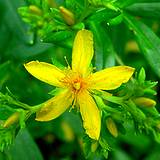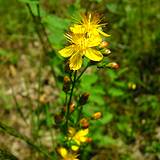|
Grandma's St. John's Wort
|
 |  |  |
The unique therapeutic benefits of St. John's wort may not appear for several weeks, and the remedy must be used for at least a few months to produce lasting effects. This medicinal herb is prescribed for mild to moderate depression and anxiety and is also applied externally to heal wounds and reduce inflammation.
In natural medicine, the herb St. John's wort is considered to be the psychological counterpart of arnica, which alleviates physical pain. The benefits can temper emotional discomfort, lift depression and calm the nerves.
St. John's wort is also very similar to some types of antidepressant medications. It's believed to raise the concentration of serotonin in the brain and enhance its activity. This neurotransmitter (or chemical nerve messenger) helps to regulate mood. You can also make a tea from this medicinal herb and is known to relax and soothe the psyche without causing sleepiness or addiction.
Caution: Avoid overexposure to sunlight and ultraviolet light when taking St. John's wort. Because the hypericin in the herb increases the skin's photosensitivity, a bad sunburn, rash or even blistering could result!
More Therapeutic Benefits of
St. John's wort
The Benefits of St. John's wort improves:
- capillary circulation
- relieves mild to moderate depression
- relieves anxiety
- supports healthy sleep
- eases gastrointestinal distress
- increases cardiac circulation
- promotes wound healing
- reduces inflammation
Studies have shown evidence that it may also be effective against viruses.
Hypericin - Main Active Ingredient
Hypercin, the red pigment contained in the petals of the St. John's wort flower, is possibly the substance responsible for the healing properties of the medicinal herb. It alleviates depression, assists the brain's pineal gland in balancing sleep-wake cycles and supplies oxygen to the cells. Drinking St. John's wort tea is an effective way to get these benefits.
Flavonoids & Essential Oils
These plant components help fight inflammation and soothe pain. For this reason, the St. John's wort tea can also be used for nerve pain, inflammation, first-degree burns and wound healing.
Medicinal Herbal Uses
Disinfecting Wounds
When applied externally, a St. John's wort tincture disinfects wounds and first-degree burns. The tincture also relieves frostbite and general hypothermia by improving capillary circulation, thus bringing blood and oxygen to the affected tissues.
To Make a Tincture Crush 1 2/3 ounces of St. John's wort flowers in a mortar. Steep the herb, covered in 1/2 cup of 100-proof alcohol for 10 days. Strain the liquid and pour it into a dark bottle for storage. Use the herb tincture as needed. Needless to say, it's good to make this tincture and keep it on hand for emergency.
Relieves Inflammation
St. John's wort oil is used for external inflammation. Mash 2 handfuls of St. John's wort flowers and put them into an airtight container. Pour 1 quart of olive oil over the flowers, cover and let the mixture sit in the sun for 3-4 weeks, shaking it daily. The oil will assume a reddish hue. You can also add a few drops of lavender essential oil or chamomile essential oil. It can be used externally as a massage oil to ease joint pain, inflammation and sprains. It can also be applied to bruises, wounds, skin inflammations and hemorrhoids.
Premenstrual Syndrome
The calming and diuretic effects of St. John's wort tea helps relieve the symptoms of premenstrual syndrome (PMS), including headaches, nervousness, water retention, moodiness and cramping.
St. John's Wort Tea Recipes
Preparation of the Tea
In a teapot, pour 1 cup of boiling water over 2 teaspoons of dried St. John's wort. Steep for 10 minutes then filter the tea through a strainer as you pour it into a cup. If desired, add honey to sweeten the beverage to our taste. Drink 1 or 2 cups of the freshly prepared tea every morning and evening, unless instructed to do otherwise by your health practitioner.
Medicinal Tea Blends
Nervous Tension
- 1 1/2 ounce St. John's wort
- 1 ounce lemon-balm leaves
- 1 ounce valerian
Use 1 teaspoon of the herb mixture per cup of boiling water. Drink a cup of this tea before going to bed each night for several weeks to calm overwrought nerves, lift depression and help you fall asleep more easily. Make sure you steep the tea for 10 minutes, strain before drinking.
Relieve Coughing Fits
- 1 1/2 ounce of St. John's wort
- 2/3 ounce thyme
- 2/3 ounce linden flowers
Use 1 teaspoon of this herb mixture per cup of boiling water to soothe irritations of the upper respiratory tract that cause coughing. This tea has proved helpful with bronchitis and whooping cough. Steep for t to 10 minutes, strain before drinking.
Relieve Migraines
- 1 2/3 ounce St. John's wort
- 1 ounce valerian
- 1 ounce linden flowers
- 1/4 ounce juniper berries
Use 1 teaspoon of the mixture per cup of boiling water. Steep for 10 minutes, strain. This tea helps dilate blood vessels and improves circulation. If our headaches are triggered by weather, drink the tea whenever you notice the weather is changing.
DISCLAIMER:
The statements made here have not been approved by the Food and Drug Administration. These statements are not intended to diagnose, treat or cure or prevent any disease. This notice is required by the Federal Food, Drug and Cosmetic Act.
Return from St. John's Wort Benefits to Grandma's Medicinal Tea Guide
Return to Grandma's Wisdom Home





